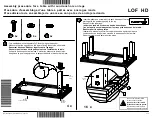
11
Composting troubleshooting
Key factors for great compost are:
1.
Correct nitrogen/carbon ratio;
2.
Correct level of moisture;
3.
Good aeration;
4.
Regular rotation.
Activators can be added to your compost to help speed up decomposition. It
includes fallen leaves, grass clippings and well-rotted chicken manure. But
sometimes things go wrong, even with composting. Most compositing problems
occur from a lack of moisture, too much moisture or an imbalance of the
nitrogen/carbon ratio. Fortunately, all these problems have a simple solution.
Problem
Reason
Solution
Bad odour (ammonia
smell).
Too much nitrogen.
Add carbon; dry leaves,
straw, turn routinely.
Bad odour (putrid smell).
Improper food scraps
added (i.e. meat).
Remove improper
material.
Pests and/or insects.
Too dry, not mixed well.
Make sure material is
mixed completely.
Pests and/or insects.
Attracted to meat scraps. Remove improper
material.
Not breaking down.
Compost is too dry.
Add a little water and
turn.
Not breaking down.
Pile is moist, but material
is dense.
Keep compost well
aerated by rotating every
week.
Material not
decomposing.
Material is moist and
dense, but not too wet.
Keep compost well
aerated by rotating every
week.
Material saturated with
water.
Material is wet, smelly
and matted.
Turn compost, add dry
brown (carbon) material.
Leaves not breaking
down.
Material is dry.
Add greens like lawn
clippings. Add a little
water and rotate to mix.
Compost smoking or on
fire.
Ratio imbalance. Excess
nitrogen.
Moisten material and mix
in more browns to keep
the balance. Turn
routinely.
Sticks not breaking down.
Incorrect material.
Remove largen wooden
chunks.






























